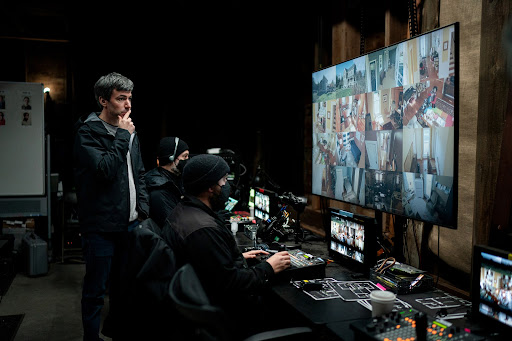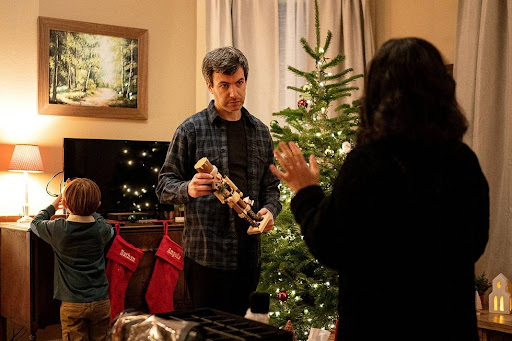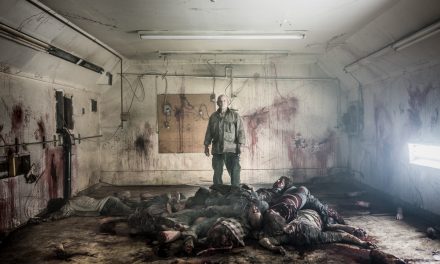This review contains spoilers.
After comedian Nathan Fielder wakes up in his Oregon home, he greets his wife and his son, Adam, and sits down for breakfast. It is wintertime, and outside their idyllic family home, dozens of production assistants are blanketing the ground and cars with snow from an ice chipper. Fielder gets up to take Adam to school, scraping the ice off his car window before driving out into the Oregon summer. As his car pulls away from the school entrance, another pulls up to take Adam to his real school. When he picks Adam up at the end of the day, Adam is three years older. This is not the premise of some surreal, Lynchian critique of small-town America. It is “The Rehearsal,” a six-episode reality show that ran on HBO from July to early August of this year.

Courtesy of HBO.
The show’s premise is relatively simple when compared to the extreme lengths Fielder goes to achieve it. He wanted to give people the opportunity to rehearse significant events in their life before they happen, such as a difficult conversation with a friend or relative. While Fielder is best known as a comedian, “The Rehearsal” has a distinct philosophical core. Can we ever truly understand one another? What if we could remove uncertainty from our lives and plan for everything that could go wrong?
Most of “The Rehearsal” follows one elaborate rehearsal in which Fielder gives Angela, a deeply evangelical woman who believes in vast satanic conspiracies, the opportunity to practice motherhood. By hiring dozens of child actors ages six to eighteen and swapping them out discreetly whenever child labor laws dictate, Fielder attempts to create the illusion of an entire childhood. “Adam” ages three years every week or so, and the challenges of raising him change. Eventually, Fielder falls into his own illusion, offering to co-parent Adam along with Angela. After being away from Oregon for three weeks, Fielder instructs the actor playing the now 15-year-old Adam to approach the scene as if Fielder has genuinely been gone for nine years. Adam’s inability to deal with his father’s abandonment sends him spiraling into drug addiction and other self-destructive behaviors. At this point, Fielder and Angela agree to turn back the clock to six-year-old Adam.
Throughout the show, Fielder goes over every little detail from real-life conversations through rehearsals of his own. On more than one occasion, he even brought in an actor to play himself so that he could review moments from another’s perspective. These rehearsals begin to fold in on themselves as the line between reality and scene blur, becoming a profoundly uncomfortable portrait of a man obsessed with creating a perfect illusion.
The ethical questions that “The Rehearsal” brings up are also poignant, as Fielder arguably manipulates real-life people into fulfilling his bizarre quest for perfection under the guise of solving real-life dilemmas. These are moral questions that Fielder seems to be asking himself as well. In one of the most poignant scenes in the series, a woman playing the part of Angela in a rehearsal confronts Fielder head-on. “Why are you doing this,” she asks him, “Are you really trying to help me? Or, am I the silly part that you talk about, huh? Is my life the joke? Do you sit here with your friends at the end of the day laughing at me?” The question is seemingly directed at both Fielder and his audience, as Angela’s extreme born-again values and assertion of satanic conspiracies seem so ridiculous that the audience feels compelled to laugh at her. But Angela is an actual person, not a character in a story. Have we refused to see Angela’s humanity this whole time?

Courtesy of HBO.
The consequences of Fielder’s quest are not revealed to him until the season finale. One six-year-old child actor, Remy, refuses to leave the set as it’s time for the nine-year-olds to step in. Fielder learns from Remy’s mother that he doesn’t have a father in real life and has begun to believe that Nathan is truly his dad. In a deeply uncomfortable scene, Fielder visits Remy at his home to ensure that he knows he is not his father, much to Remy’s dismay and denial. Fielder spends the rest of the episode obsessing over what he did wrong, getting other child actors to play Remy and re-doing moments in which he may have built a connection that was too real. In processing the real-life psychological consequences of his actions, Fielder has an epiphany: “Life’s better with surprises.”
“The Rehearsal” is a profound and emotional Rorschach test for viewers that is truly unlike anything that’s come before it. It is funny, uncomfortable and fascinating all at once. Critiques of the show (such as Richard Brody’s scathing piece in the New Yorker) are valid as, despite Fielder’s self-awareness of its immoralities, he still uses real people (including children) to make that point. Yet, art is challenging, and Fielder wants us to feel uneasy. However one feels about “The Rehearsal,” it’s hard to deny that it elevates the medium of reality television to provide a look at the human psyche that is somehow both artificial and uncomfortably real. When everything is simulations and simulacrums, the only real thing left is ourselves.
Jackson Schneider (he/him) (23C) is from Lafayette, Louisiana, majoring in political science and economics. He is an undergraduate research fellow at the Center for Law and Social Science, a Franklin Fellow, and is involved with the Emory Undergraduate Research Journal and Emory PRIDE. He loves watching old movies, taking photos, and coffee shops.





